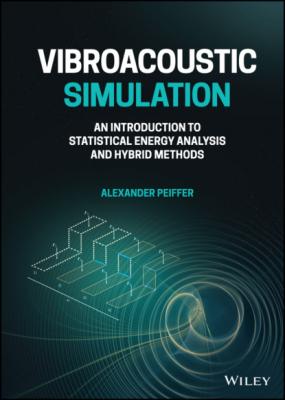Vibroacoustic Simulation. Alexander Peiffer
Читать онлайн.| Название | Vibroacoustic Simulation |
|---|---|
| Автор произведения | Alexander Peiffer |
| Жанр | Отраслевые издания |
| Серия | |
| Издательство | Отраслевые издания |
| Год выпуска | 0 |
| isbn | 9781119849865 |
With this procedure the matrix formulation of the equation of motion can be created. A similar approach can be used if other elements like dampers are involved. Generally the local elements can be everything that can be expressed by a dynamic stiffness matrix [D(ω)] and can be added into a global matrix, independent from the fact if it comes from other models, simulation or test.
1.4.3 Power Input into MDOF Systems
The power introduced into the MDOF system is calculated according to (1.49).
The input power can be reconstructed from the dynamic stiffness matrix (1.89). We know that
hence
or in matrix notation
1.4.4 Normal Modes
Modes are natural shapes of vibration for a dynamic system. For a given excitation it would be of interest to see how well each mode is excited. In addition, these considerations lead to a coordinate transformation that simplifies the equations of motion.
We start with the discrete equation of motion in the frequency domain (1.89) and set the damping matrices [C] and [B] to zero
Without external forces we get the equation for free vibrations, and we get the generalized eigenvalue problem
The non-trivial solutions of this are determined by zero determinants
providing the modal frequencies ωn. Entering these frequencies and solving for Ψn provides the mode shape of the dynamic system. These are the natural modes (shapes) of vibration that occur at the modal frequencies.
The mode shapes are orthogonal as can be derived by assuming two different solutions m,n
Multiplying (1.107) from the left with the transposed {Ψm}T gives
Transposing (1.106) and multiplying from the right with {Ψ}n reads as
The difference between (1.108) and (1.109) leads to
